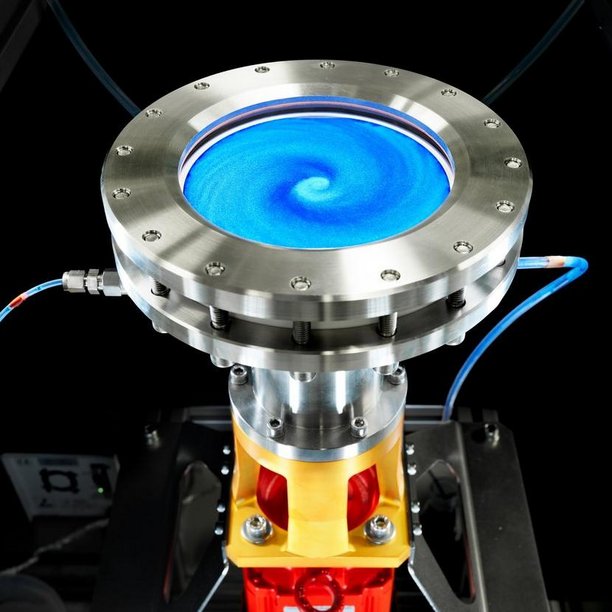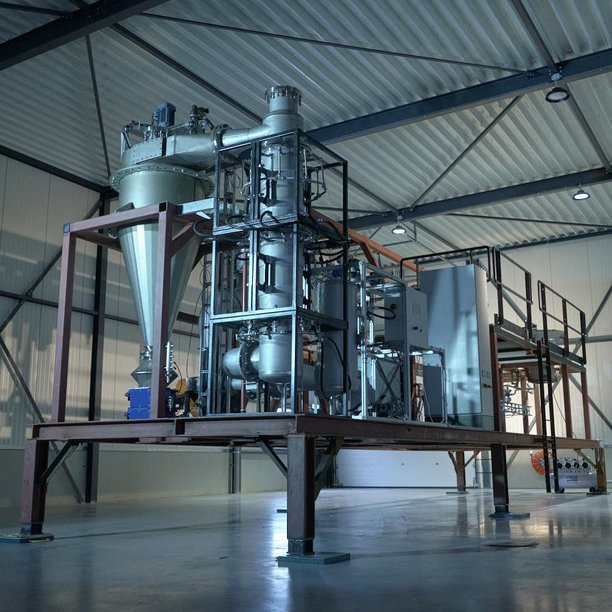Engineering for Sustainable Energy Systems
To design, develop, test and demonstrate engineering solutions for energy systems. This involves understanding of (electro)chemical transformation, multiphase transport phenomena and separation.

INTRO
The focus area Engineering for Sustainable Energy Systems will primarily address the engineering of systems for the production and use of sustainable energy carriers like H2, NH3, metal powder and renewable carbon containing fuels (e.g. methanol, DME, OME and LNG). On the production side these are electrolyzers for H2 as a key enabler and technologies to convert H2 in other energy carriers like NH3, renewable carbon based fuels from CO2 and metal powder. On the use side focus is on combustion systems like furnaces, turbines and engines and regeneration of metal powder.
This focus area is tightly connected and complementary to the focus area Chemistry for Sustainable Energy Systems, which addresses the chemical aspects of (electro-)chemical systems for renewable fuels. Together with the focus area of Systems for Sustainable Hea', they naturally flow towards the focus area on System Integration.
Iconic project: Metal Fuels
Metal fuels have a volumetric energy density that is even higher than that of current liquid fossil fuels and do not require compression or liquefaction, can be handled, transported and stored over long periods of time, and can be used as a completely CO2-free circular source of energy. Conversion and reduction of metal fuels as dense energy carriers is a new area in science and technology with a huge potential, especially for long-term large-scale energy storage purposes. First applications are foreseen in high-temperature industrial heating processes, heavy duty transport (long-haul trucks and ships) and for refurbishing coal-fired power plants. Research is still in its infancy and TU/e is one of the front-runners worldwide. TU/e’s strong position in the area of clean and efficient combustion of future fuels is a firm basis for expanding this position.
Principal Scientists
Departments involved/ contributing to EIRES
- Applied Physics
- Chemical Engineering and Chemistry
- Mechanical Engineering
Applied Physics
The Applied Physics department carries out intensive research activities on novel material synthesis and control on material properties at the nanoscale. Specifically, the research groups 'Advanced nanomaterials and devices', 'Plasma and Materials Processing' and 'Molecular materials and nanosystems' exploit state-of-the-art processing routes, such as epitaxial growth of III-V semiconductor nanowires; atomic layer deposition of metal nano-particles and ultra-thin layers of metal oxides, nitrides, phosphates and 2D transition metal dichalcogenides; solution processing of nano-sized organic and inorganic molecular systems. The energy-related applications include: thermoelectric and solar cell nanowire devices; polymer, metal halide perovskite, crystalline silicon and tandem solar cells; photo-electrocatalysis; redox flow batteries. The nanofabrication steps are extensively supported by NanoLab@TU/e, a state-of-the-art cleanroom hosting also material characterization tools ranging from SEM to focus ion beam etching, XRD and XPS. Furthermore, the 'Physics of nanostructures' group hosts a dedicated UHV sputter and evaporation units for the deposition of multilayered ultrathin (< 1 nm) films. The Applied Physics department is also renowned for its studies on CO2-fed plasma and vibrational kinetics studies carried out in the 'Plasma and materials processing' and 'Elementary processes and gas discharges' groups. All the experimental research efforts so far described are complemented by simulation and modelling activities carried out by the 'Elementary processes and gas discharges' and 'Materials Simulation and Modelling' groups, the spin-off Plasma Matters B.V. and the Center for Computational Energy Research (CCER), which aims to provide a computational foundation for a smooth and successful transition towards a sustainable global energy system.
Chemical Engineering and Chemistry
The energy related research at the Chemical Engineering and Chemistry department is extensive and carried out by several research groups. Focus on novel materials (synthesis and characterization) for energy applications can be found in the research groups 'Inorganic materials and catalysis' (catalysts), 'Stimuli-responsive functional materials & devices' (sustainable energy), 'Membrane materials and processes' (membranes, porous materials) and 'Molecular materials and nanosystems' (photovoltaics). The focus on novel materials is complemented by the research activities of the 'Multi-scale modelling for multiphase chemical reactors' and 'Sustainable chemical processes' groups, which focuses on sustainable, efficient and safe technologies for separation, process intensification, electrochemical engineering, biomass conversion. The CEC department hosts material diagnostics (IR, Raman, XPS, XRD, NMR, TEM etc.), state-of-the-art nearly in situ electrochemistry (NAP-XPS) and electrochemistry equipment and reactors (including the spinning disc electrolyzers).
Mechanical Engineering
The department of Mechanical Engineering (ME) works on various energy related research topics. Within the group 'Energy Technology and Fluid Dynamics' renewable energy storage systems are studied, i.e. with the aim to develop new materials and systems for energy storage for domestic and industrial applications, in the form of heat and chemicals. Within the group 'Power and Flow' focus is on dense energy carriers, such as renewable liquid fuels for heavy transport by road, metal fuels for industrial heating. Another topic studied is the generation of hydrogen through electrolysis, as well its combustion. The ME department makes use of various advanced research tools, mostly developed in-house. This includes various flow measurement tools (PTV, PIV, CT, XRT), laser-based diagnostics and accurate and efficient validated numerical simulation models (DNS, LES).
Research and application areas
- H2O electrolysis
- H2 combustion systems
- Heavy duty combustion systems
- Metal fuels
- H2O electrolysis: Although commercial H2O electrolyzers are available, only 4% of the total H2 production derives from electrolysis, these electrolyzers are not competitive with fossil fuel based H2. Because electrolyzers can be easily powered by renewable electricity, this presents a huge opportunity. The flagship project, “The Dutch Electrolyzer” aims to develop a washing machine sized electrolyzer for hydrogen production on a 1-10 MW scale, which can deal with highly variable current densities. The relatively small size allows for high production volume manufacturing with large economic benefits. To reach this goal, fundamental research is needed to make steps in electrode stability, electrode overpotential, more efficient membranes, and better hydrodynamic design of the electrolyzer. EIRES provides a unique opportunity for an integrated approach that bridges the fundamental research on the design and synthesis of improved electro-catalysts with the areas of electrochemical reactor and process system engineering and advanced manufacturing technology. The expertise developed on this project is easily translated to other electrolysis processes, e.g. reduction of CO2 to carbon-based fuels.
- H2 combustion systems: While the use of H2 and related fuels, such as NH3, offers the possibility of carbon-free heat and power generation, their combustion properties are vastly different from natural gas, which demands the development of new combustion concepts and systems. The peculiar combustion phenomena related to the high reactivity and diffusivity of H2, pose many scientific and technological challenges, such as combustion instabilities and nitrogen emissions. The aim is to develop fundamental understanding of these phenomena and to translate this into technological solutions for safe, clean, and efficient conversion of these sustainable fuels.
- Heavy duty combustion systems: To use new renewable fuels efficiently they must be adapted and optimized. Be it for the use of H2 directly, for which an ultra-efficient concept exist (~70%, ‘the Argon-Engine’), or for the use of derived synthetic fuels like NH3, methanol/ethanol, or even for more diesel-like fuels like DME and OMEx. Several opportunities exist that have a very high efficiency and very low emissions at the same time. (this links to the products coming from CO2 electrolysis topic in the focus area Chemistry for sustainable energy systems)
- Metal fuels: fine metal powder is an excellent way to store energy. For this new type of dense energy carrier, existing processes need to be redefined (e.g. the refurbishment of a coal-fired power plant for the use of metal fuels). TU/e has a worldwide leading position on the use of metal powders as dense energy carrier. Challenges here pertain to the controlled combustion, regeneration of metal oxides or the reversed storage of energy which can be done in chemical ways (using hydrogen from electrolysis) or, preferably, by direct metal oxide electro-reduction.
Opportunities within TU/e: The scientific mission outlined above is motivated by the fact that existing energy systems are developed and optimized for different, fossil-based fuels. To enable the efficient and economically viable use of renewable fuels the development and/or adaptation of sustainable energy systems is needed. We will develop computational fluid dynamics tools to numerically predict the detailed dynamics in the various energy systems. There will be clear links within this theme with the theme on physics driven and data driven artificial intelligence within EAISI. These studies will be complemented by various advanced diagnostic tools, which are both used to validate the outcomes of the numerical studies, but also to provide insights that are not yet covered in our numerical tools. We will develop and demonstrate with industrial partners novel materials, processes, and designs, allowing for a rapid level-up rate in TRL towards large scale application and significant economic benefits. Because of the multidisciplinarity inherent to energy systems, EIRES provides a platform for researchers to cooperate and benefit from all available expertise and infrastructure.
Profiling of the focus area outside EIRES and TU/e: testing and demonstration of novel energy systems will be done in close collaboration with various partners, including DIFFER, TNO, ECN, ISPT, Nouryon, Nyrstar, Tata Steel, Shell, Groupe PSA, Uniper, Engie, PGE, RWE, Pometon, MTT, EM-Group, Romico, Metalot3C, DENSE, and Team SOLID. A plan will be drawn to setup bilateral and/or round-table meetings with the industrial and R&D landscape to steer the research program and shape the content of mid- and long-term research lines (for example, by means of an ITN Marie Curie). The focus area should also strategically monitor the developments within the meerjarige missiegedreven innovatie programma’s (MMIP’s). Contact will be pursed also with the energy institutes present at the other Dutch (technical) universities, as well as the ISPT, in order to highlight differences and complementary aspects in the scientific mission and approach, as well as to sharpen the identity of the focus area and of EIRES.
CloseRelated Research Groups
We acknowledge the TU/e research groups which are already involved with EIRES, either through the TU/e Sector Plan positions and PhD projects. We welcome all research groups interested in collaborating and contributing to the research focus of EIRES.
Electromechanics and Power Electronics
Plasma & Materials Processing (PMP)
Membrane materials and processes
Inorganic materials and catalysis
Power & Flow
Sustainable process engineering
Energy Technology and Fluid Dynamics
Multi-scale Modelling of Multi-phase Flows
Chemical Process Intensification
Researchers
We acknowledge the TU/e researchers which are already involved with EIRES, either through the TU/e Sector Plan positions and/or PhD projects. We welcome all researchers interested in collaborating and contributing to the research focus of EIRES.
Adriana Creatore
department of Applied Physics
Fausto Gallucci
department of Chemical Engineering and Chemistry
David Smeulders
department of Mechanical Engineering
Harald van Brummelen
department of Mechanical Engineering
Hans Kuipers
department of Chemical Engineering and Chemistry
Martin van Sint Annaland
department of Chemical Engineering and Chemistry
Korneel Wijnands
department of Electrical Engineering
Hans Kuerten
department of Mechanical Engineering
Philip de Goey
department of Mechanical Engineering
Evgeny Rebrov
department of Chemical Engineering and Chemistry
Elena Lomonova
department of Electrical Engineering
Henk Nijmeijer
department of Chemical Engineering and Chemistry
Emiel Hensen
department of Chemical Engineering and Chemistry
Interesting reads
- Competing Marangoni effects form a stagnant cap on the interface of a hydrogen bubble attached to a microelectrode | April 21, 2021
- EIRES: Het instituut voor hernieuwbare energie dat ons dichter bij de oplossing brengt | January 11, 2021
- Energy from iron is only sustainable when recycled 100 percent | December 15, 2020
Contact
EIRES | Focus Area: Engineering for Sustainable Energy Systems
- Niels Deen - n.g.deen@remove-this.tue.nl
- John van der Schaaf - j.vanderschaaf@remove-this.tue.nl
- EIRES office - eires@remove-this.tue.nl
